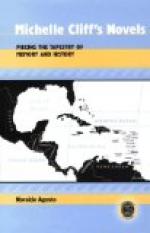|
This section contains 5,427 words (approx. 19 pages at 300 words per page) |

|
SOURCE: "Race, Privilege, and the Politics of (Re)Writing History, An Analysis of the Novels of Michelle Cliff," in Callaloo, Vol. 16, No. 1, Winter, 1993, pp. 180-91.
In the essay below, Edmondson examines the ways Cliff configures race, class, and gender distinctions in Abeng and No Telephone to Heaven to represent postcolonial West Indian identity.
Historicizing Race
The white creole occupies an ambiguous space in West Indian society. On the one hand she is the descendant of the colonizer: by virtue of her colour she is virtually guaranteed a position of relative power and privilege if she so chooses. Even if she does not choose, the creole is bound to her birth-right by her race, since, as Albert Memmi observes, the colonial who does not accept the ideologies and privileges of the colonizer does not—cannot—effectively exist. Still, the white creole is in many ways culturally "black," or Afro-Caribbean...
|
This section contains 5,427 words (approx. 19 pages at 300 words per page) |

|


